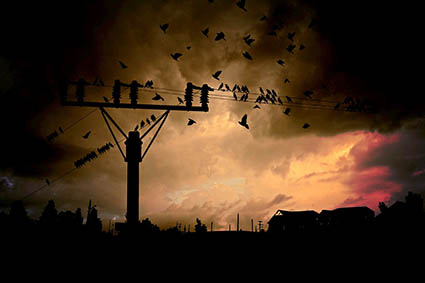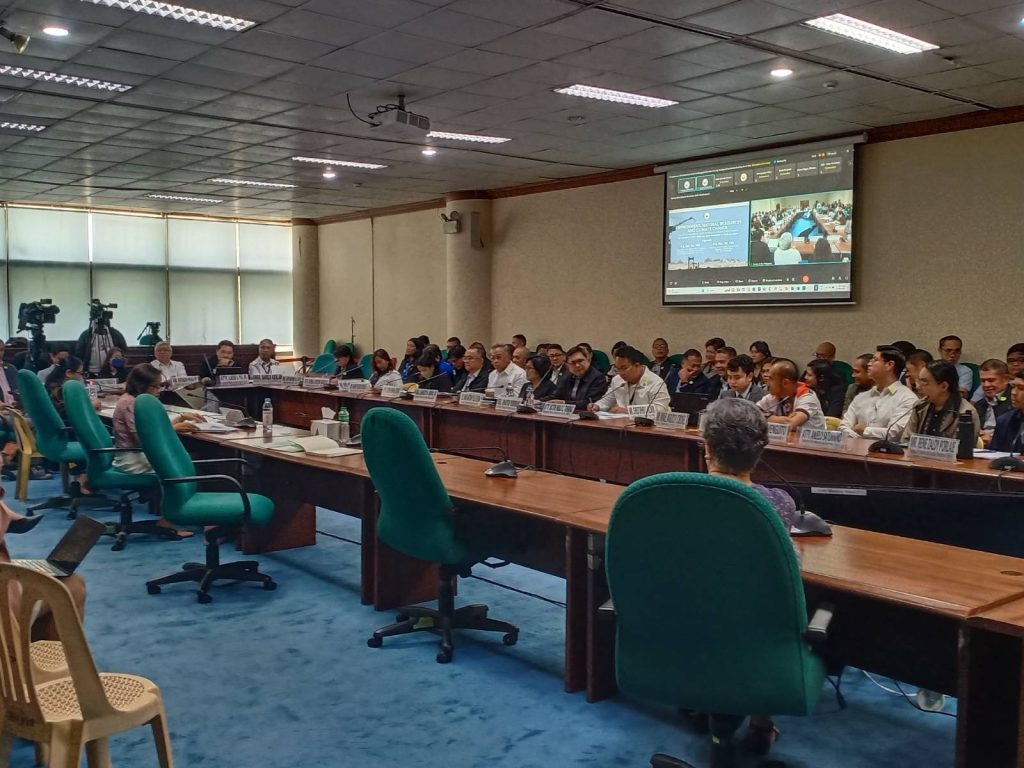
Sabotage on Tesla: The Confessional Letter
Sabotage on Tesla – Editorial
It’s a chilly spring night in early March in Gruenheide, which is around 40 km (25 miles) away from Berlin. A few determined people walk across a flat meadow surrounded by pine forests at a wintry zero degrees. They stop at a high-voltage pylon, ignite the cables, then trigger a short circuit with water. Flames shoot up with the help of car tires, the high-voltage pylon spits fire into the darkness of the night.
It may have happened roughly like this when the environmental activists from the Vulkangruppe Tesla Abschalten! (Volcano Group Switch-off Tesla!) successfully committed an act of sabotage on March 7 against the Gigafactory Tesla, Europe’s only E-car factory.
Huge Financial Losses
The power at the nearby plant goes out immediately and it’s assembly line producing 500,000 vehicles a year, comes to a standstill.
The Volcano Group, which published a letter of confession rated as genuine, calls it a “total failure of a seemingly unassailable giant”.
A few days later employees gather in solidarity in front of the Tesla plant to show that they stand by their employer, as if he needed that empathy. Elon Musk though knows how to twist the opinions in his favor, stating that “the dumbest eco-terrorists in the world […] are puppets of those who have no good environmental goals,” in other words: he’s the one with excellent environmental goals and clearly not a puppet but a master.
Today, on March 12, the Gigafactory is running again in slow capacity, but these five days of production stoppage have caused a loss in the “high nine-digit range”, although according to a podcast by the FAZ newspaper this refers to profit rather than turnover. Car bodies had to be scrapped and robots repurposed. Tesla shares slumped by 3%.
Not bad for one burning high-voltage pole.
Citizens Against Clearcutting
There were 5,000 households and small businesses cut off from the power supply for several hours. The environmental activists apologize for this and said that there would have been no other way to shut down Tesla without risking a power outage in other areas. However, they would have ensured that no human lives were put at risk.
The activist group is not alone in its criticism of the Gigafactory: the Gruenheide Citizens’ Initiative and Tesla den Hahn Abdrehen! (Turnoff Tesla’s Tap) have been protesting against environmental poisoning and water shortages since the car manufacturer’s launch. Now Musk wants to expand the plant by 170 hectares.
A week before the sabotage, environmentalists joined forces to protest against the expansion by occupying a woodland where they set up a camp in the region, the police have approved the protests until Friday. Most of Gruenheide’s residents also oppose the expansion, for which Tesla wants to clear 100 hectares of forest.
Sabotage Weakens Industries
The Volcano group is now accused of anti-constitutional sabotage and will be prosecuted severely. But it was worth it, because our society needs these wake-up calls of property damage that temporarily paralyze the infrastructure of corporations.
The batteries for electric cars require rare earths and lithium, which are produced under the most catastrophic environmental and working conditions, so we cannot look the other way and leave it as it is without reacting.
It takes sabotage to leave a statement that makes international news. Common people see the industries and their power as untouchable, as natural, when in fact they’re only manmade so men (and women) can undo the damage that has been done to our only and sacred planet.
With the attack of the Volcano Group we see that powerful corporations are not as powerful as they seem. That small acts can have big impacts.
We stand up for this sabotage action, because the exploitation of nature and people has reached a level that we have to fight from all kinds of levels.
Here you can find some photos of the attack
Protests on March 10 against Tesla’s expansion
Volcano Group Switch-off Tesla! : Attack on power supply
The confession letter from March 5:
We sabotaged Tesla today. Because Tesla in Grünau eats up earth, resources, people, manpower and spits out 6000 SUVś, killer machines and monster trucks per week. Our gift for March 8 is to shut down Tesla.
Because the complete destruction of the Gigafactory and with it the cutting off of “techno-fascists” like Elon Musk is a step on the path to liberation from the patriarchy.
The Gigafactory has become known for its extreme conditions of exploitation. The factory contaminates the groundwater and consumes huge amounts of the already scarce drinking water resource for its products. The state of Brandenburg-Berlin is being dug up for Tesla without any scruples.
Critics at the waterworks, local residents and eco-activists are being silenced. Figures are embellished. Laws are being bent. People are deceived. Yet a large part of the population around Grünheide rejects the Gigafactory because of water theft and gentrification. The protest and resistance continues unabated. And it is growing, because there is more than one reason. In addition to the dirty battery factory, Tesla now wants to expand its factory site by a further 100 hectares, including for a freight yard. An expansion of the storage and logistics areas directly at the plant (including the possibility of intensive rail logistics) is intended to help stabilize supply chains and production. This is currently impaired because deliveries from the forced labor camps in China cannot take the direct route through the Red Sea. The Brandenburg Ministry of Economic Affairs is eating out of Tesla’s hand, despite many reasons for refusing any approval. The only important thing is that Brandenburg is flourishing as a business location.
Tesla is a symbol of “green capitalism” and a totalitarian technological attack on society.
The myth of green growth is just a dirty ideological magic trick to close the ranks against domestic criticism. It suggests a way out of the climate catastrophe. But “green capitalism” stands for colonialism, land theft and an exacerbation of the climate crisis! Lithium batteries come from toxic mines in Chile and devour other rare metals, which means misery and destruction for the people in the mining areas. The battery factory in Grünheide near Berlin, for example, requires the rare raw material lithium, which is also mined in Bolivia. Musk puts his cards on the table to push through lithium mining in Bolivia: “We will coup if we want to”, commenting on the indigenous resistance to mining. Mineral resources are being ripped from the earth under brutal conditions. The “green deal” is merely the expansion of economic growth without limits. In Portugal, too, the rural population is resisting the forced extraction of lithium.
Just as the earth is used and raped on a daily basis, Tesla does the same with people. And has forced laborers all over the world, such as Uyghur people in China, working (to death) for it (just like VW), whom the racist Chinese regime serves up to the company for its production. Even in Grünheide, the working conditions are considered catastrophic. Only recently, a works council member of IG Metall in Grünheide was dismissed. Despite a yellow works council installed by Tesla, the conditions in the factory are leaking out. In order to improve accident statistics, people are taken to hospital by cab instead of by emergency call and ambulance. Internal opponents are dismissed and if they take legal action, they are forced into a legal settlement. The compensation is then used as a muzzle, for example to stifle public discussion of a racist dismissal by threatening contractual penalties. The terminated employee has to shut up for the money – that is the calculation.
The totalitarian technological attack then looks like this.
A Tesla vehicle is a surveillance device for public spaces
It is equipped all around with high-resolution cameras from Samsung. Samsung is a company that is a leader in weapons technology, among other things.
According to the manufacturer, the cameras record up to 250 meters away. In “guard mode”, they film everything in the vicinity of the vehicle and guarantee that the driver is also monitored while driving. The driver is already a free integral part of the Telsa universe and a guinea pig. Artificial intelligence will register every movement and every mistake made by the driver and monetize it in order to train the software for autonomous driving with the data.
Tesla is militarizing the road. Its moving tanks are weapons of war. The car as a weapon. The road is the battlefield.
Instead of 9mm, Tesla has now introduced 856 hp to the world: “If you get into a fight with other cars, you will win,” says Elend Musk.*
*Elend means misery in German, a word play for Elon (comment by the editor)
A Tesla is a status symbol, statement and propaganda at the same time: for contempt for humanity, boundless destruction through “progress” and an imperial, patriarchal way of life.
Anyone who buys an SUV is most likely a supporter of an imperial way of life who wants to profit from this madness to the bitter end. Every activist’s secret poetry album should include a scrapped Tesla. No Tesla in the world should be safe from our flaming rage. Every Tesla that burns sabotages the imperial way of life and effectively destroys the ever-tightening network of seamless smart surveillance of every expression of human life.
Armies use Tesla’s Starlink satellite system in their wars
For example in Ukraine. Russia’s army also accesses Starlink satellite terminals from third countries to carry out attacks. Israel also uses the Starlink satellite system to murder people in Gaza. Tesla’s Starlink infrastructure is a military player. Rolled up like a string of pearls of garbage, they plow through the sky to make surveillance total.
Let’s talk about a man who will crumble to dust, even if he would rather be immortal: Elon Musk.
For men like him, the swear word has not yet been invented that could aptly describe them in their arrogance, contempt for humanity and anti-social greed for power and recognition.
He makes no secret of his chauvinism. His propaganda platform X is the means to an end. This is where he gathers supporters of an imperial way of life. This is where anti-Semites, anti-feminists, authoritarians, chauvinists, fascists and supporters of hatred against “foreigners” reassure themselves. This is where they organize themselves with their elitist view of the world and as master race. This is where the Aryans of the AfD meet their peers.
When Elon Musk cheers the anti-feminist and neoliberal president of Argentina on X, it is because they are united. There is no shyness in this regard, they have decided to stand on the side of a deadly masculinism and drag a trail of blood behind them like a man-eating monster.
Elon Musk is the new type of neoliberal and patriarchal, neocolonial predatory capitalist of this century, who uses different means than the exploiters before him in the last century.
It is an invasive zeitgeist that uses the self-fabricated economic crises of valorization in order to tackle the next destruction. It is only following in the prepared brown footsteps of other patriarchal pioneers. Even the “carmaker” Henry Ford was an admirer of the Nazis with their “Volkswagen” and their efficient organization of industry. The plant in Wolfsburg was run on the backs of forced laborers. Every German was to be able to get a Volkswagen in order to reach their destination by car or tank on the new autobahn. Ford, inspired by the efficiency of German labour organization, transferred the ideas to his empire in the USA. The attack on workers and the economization of exploitation became known as “Fordism”.
This included work organization and assembly line work – mass production with simultaneous mass consumption of the car. The model, also known as Taylorism, was also a class struggle from above. Elon Musk combines the invasive technological possibilities of our time with his mysogynistic world view, patriarchal extremism and the totalitarian attitude typical of his caste. As a “car manufacturer”, he is a revenant in historical tradition. In keeping with the times, he acts as a “techno-fascist”.
Instead of scrapping the car on the garbage heap of history and expanding free public transport, only the drive technology is being changed, from combustion engines to electric motors, in order to save individual transport. The imperial way of life is economically more lucrative.
The positions of power allow patriarchal “visionaries” such as Elon Musk to experiment with the most “advanced” forms of exploitation and with the available resource of “human beings” in the most terrible sense.
Conquering new territories and penetrating the earth without being asked
Into space, into the sky, into public space, into our heads – the rapist leaves nothing untouched. The neurotechnology company Neuralink aims to link human brains with machines. It is using animals to test how streams of thought can be read. Just like SpaceX and Tesla, Neuralink is also aiming for a long-term perspective in which people are worth different things. In which some people are entitled to a better life within the ecological catastrophe that is already underway.
Even if you are not on X, formerly Twitter, if you are just walking through the public streets, you will still be touched by this wretched man and his cameras and propaganda. The positions of power allow a permanent encroachment, an invasive relationship towards all life that can only be stopped by resolute resistance. The “technological progress” of the epochs offers them, the “techno-fascists”, a tool of possibilities with which the exploitation and indescribable destruction of the planet is always topped off.
In its abundance of power, this type can sometimes act like a head of state without having been elected
They have the necessary means of production and the “human” resource to make political decisions. This type can buy heads of state or bring parties to power, even if they are called Hitler. This type is the mastermind behind the alleged decision-makers of governments. They can impose conditions on states or reduce heads of state to supplicants. The patriarchal system churns out tons of people like this, they strive for the top because that corresponds to the patriarchal model. They stage coups when things don’t go their way. They are replaceable. Only their power gives them these opportunities – without power they are just pompous, ridiculous egomaniacs. They have been driving millions of people to their deaths for centuries, destroying nature as if it belonged to them. If we don’t destroy the system that produces such egomaniacs, new ones of their kind will emerge. So it is not (only) about misery Musk – but about an imperial way of life – that these men are imposing on us. It’s about a showdown between an imperial way of life versus freedom for all people.
This type of person and their economic concept represent a minority on this planet who believe that this imperial way of life is the only right one. What is new is that the tipping points that show us the finite nature of this destructive way of life have been passed in many cases. Other tipping points are approaching at breathtaking speed. Year by year, month by month, day by day.
(If all else failed, Elon Musk and a handful of slaves and his ilk would flee the consequences of his imperial way of life and insult Mars with his presence. But our strong extra-planetary allies are already waiting for him; solar storms would crash his rocket, as they have done to 30% of his satellites in space before. So we will win.)
Many people still consider this way of life and the supposed wealth associated with it to be natural and desirable
Many people, clouded and misguided, confuse possessions and material wealth with freedom and happiness. Ignorance, manipulation and fear characterize generations of many people. We are reduced to work and consumption and degraded to an imperial way of life. This material wealth at the expense of other people is an indictment of “civilization”. This way of life does not make its beneficiaries happy either. The alternatives are made invisible or destroyed in the making. Approaches that could benefit humanity without generating money or power are delegitimized. Indigenous ways of life that relate to nature and its protection have been and are being wiped out. Emancipatory approaches that go to the roots have been drowned in blood in all eras. Or revolutionary movements are corrupted, infiltrated, their “leaders” bought in order to secure domination and the progress of destruction for decades to come.
On the eve of March 8th, we therefore lit a beacon against capital, patriarchy, colonialism and Tesla
We counter the ongoing rape of the earth with sabotage. The ideology of limitless economic growth and a belief in progress based on destruction have reached their end. In order for Europe to become a “first-class investment location with a strong industrial ecosystem”, giants like Tesla are still being rolled out of the way. But something is slipping. We, a broad and colorful resistance, are rolling them back down. We are the heaps of rubble and grains of sand in the gears of a machine that is stamping inexorably forward. We are disruptive factors in the engine room. We are the desperate and the outcasts. We are middle-class people in Germany or migrants on the run. We can be many people in the forest and in the tree houses and on the street, we can be covert sabotage groups like ours. It can also be people in the gigafactory who take revenge on their foreman’s machines for his working conditions. We can be caught, beaten, humiliated, raped or murdered – but we are in the right. Only violence can keep us down. But we will get up again. And others will come after us.
With our sabotage, we have set ourselves the goal of the largest possible blackout of the Gigafactory. We have ruled out endangering our lives and the lives of others. The shutdown of production in the automotive industry is the beginning of the end of a world of destruction. Our bonfire of liberation was aimed at supplying Tesla with electricity. We wanted to hit the overhead line of a high-voltage pylon in the connection to the underground cables at the watertight cable sleeves and short-circuit the six 110 kV cables inside. To do this, we opened the shaft to the cable joints, half of which was under water. We still flamed the exposed power cables and, in combination with the water, may have caused a short circuit. Damage to cable joints is often time-consuming and expensive to repair. At the same time, we set the fire large and high with lots of car tires to weaken the steel structure and cause the mast to become unstable.
A steel mast only melts at around 1300 -1500 degrees. As we were working with a heat development of around 900 degrees, the aim was to change the mechanical properties of the mast. As a steel structure under load, a rapid, large fire from 500 degrees upwards can lead to a loss of strength and change the stiffness, yield strength and elasticity of the metal. This can lead to buckling effects, twisting or deflection. That was our intention.
We feel connected to all the people who are fighting around the world and who are reaching out with our words
We feel connected to all the people who will not let Tesla turn off the tap. If we want to win against such giants as Tesla, we need many forms of resistance. Ours is one of many. Unpredictable and diverse, only together can we force the Brandenburg Ministry of Economic Affairs to respect the will of the people. Minister of Economic Affairs Jörg Steinbach (SPD) sees the result of the vote by the residents of Grünheide (71% against the expansion of the Tesla factory site) as just one important vote. Above all, he sees the vote as a “healing opportunity”, which means that Tesla has not succeeded in convincing people and the company still has to do its homework in order to divide, buy, cajole and persuade the population. He does not accept the public’s “no” and calls on Tesla to soften the “no” by May.
Everyone is free to be openly or secretly happy about our action. Anyone who feels compelled to distance themselves should ask themselves why? And who has an interest in this?
Together we will bring Tesla to its knees. Switch off for Tesla.
Share the declaration. Translate it and send it to other people in the global struggle.
Volcano Group switch-off Tesla!
The addendum from March 11:
Follow-up to the arson attack on Tesla
Open letter to the citizens’ initiative in Grünheide and the alliance “Tesla den Hahn Abdrehen” (Turnoff Tesla’s Tap).
To the various organizations and action groups. To the squatters.
To the private households affected by the power outage.
We, the “Shutdown Tesla Volcano Group!”, speak only for ourselves. We do not speak for other Volcano Groups. Nevertheless, we have been inspired by the content of the actions of other Volcano Groups and have adopted formulations and content that have convinced us. By and large, we share the actions that have been carried out by Volcano Groups since 2011. So much for the many speculations about our group “Shutdown the Tesla Volcano Group!”.
We do not speak for the citizens’ initiative in Grünheide, nor for the “Tesla den Hahn Abdrehen” alliance, nor for other organizations and action groups that criticize Tesla, protest and develop resistance for various reasons. What we have in common is the intention to put up barriers to Tesla and prevent the planned battery factory and other corporate logistics, even if our approach goes far beyond that. This is not a problem for us. We see no reason to distance ourselves from public groups and respect your work.
We recognize the great pressure that some local groups were unable to escape after our attack with its far-reaching consequences
We read many statements as uncertainty rather than distancing. We also understand the concern about the status of the occupied site in the forest or the worry about acceptance among the population. Why allow yourself to be put under pressure and not react calmly to blatant calls to distance yourself? There is no reason to distance yourself from our action, for which you are not responsible. Distancing yourself from each other is not very helpful. Everyone is free to be openly or secretly happy about our action and the shutdown at Tesla. Anyone who feels compelled to distance themselves should ask themselves why? And who has an interest in this?
Nor do we believe that we have harmed the “cause”. For one thing, the “cause” is seen differently. For another, we are proposing a different perspective:
We have been able to implement “Stop Tesla” in the short term. The total failure of a seemingly unassailable giant should bring tears of joy to all our eyes and give us courage beyond the pressure that weighs on us. The nimbus of the unassailable has been broken by this action. And as important as the regional level is, the international context is just as important. The resistance against Tesla has been put in an international light by the action and has also brought attention, encouragement and support to the local resistance.
We have the greatest pressure. The head of Brandenburg’s CDU has expressed the strategy of the investigating authorities at the highest level. The aim is to catch the perpetrators and punish them severely in order to deter others from coming up with similar ideas.
The accusation of “anti-constitutional sabotage” is countered by the “right to resist”. The idea is in the world, even if we could be caught.
We are biased. We are handing over further political evaluation and classification to other militant groups
The scale and impact of the action is already huge. Even before our letter on the arson became known, Tesla shares fell by 3%. The market does not forgive vulnerability and weakness. After all, an international “global player” of the “technological attack” on society was severely hit and demonstrated. This signal was not only immediately understood by the country’s economically liberal politicians, but was also evaluated at the highest levels of business representatives and politics. Within hours of the letter becoming known, the various institutions attempted to avert the damage to Brandenburg’s and Germany’s image as an investment paradise and took countermeasures. Jörg Steinbach from the Brandenburg Ministry of Economic Affairs immediately phoned Elon Musk. They assured each other of their common interests for the future.
We recommend that the citizens, the local groups and the tree houses allow themselves to be less impressed by our action
And less influenced by the pressure to distance themselves, and instead study the reactions of politics, the state and ultimately the economy more closely.
Because here it becomes clear how determinedly the opponents are trying to push through the further Tesla settlement. It is clear how resolutely the social model of “destructive progress” is being adhered to. We will not go into the content of the latter here. Some older texts by other Volcano Groups and many other militant groups have said something about this.
We don’t just want to prevent something. Together, we are all in a position to initiate a change of direction. Tesla can become one of the crystallization points of this confrontation with the global social model of “destructive progress”. So it goes far beyond the regional.
In these dark times, our action is a small beacon that, with the old tires and our measurements on site, came to around 1000 degrees. Sabotage groups like ours are an important part of the resistance, even if the priorities of other important groups are different. No small militant group alone, no regional group and no non-violent action group that has traveled here can defeat this major opponent. Stopping Tesla can only be done together.
We are not distancing ourselves.
For us, non-violent and militant are not contradictory
In order to divide the movement against Tesla, politicians and the investigating authorities have resorted to the familiar rhetorical tricks. “Left-wing extremists”, “Green RAF”, “terrorism”, “stupidest eco-terrorists in the world”, “children of the RAF”, “blind destructive rage”, “close to terrorism”, “internationally operating criminal gang”, “terrorist organization” are all attempts at stigmatization. Rather, it is also about a desolidarization within the population! This rhetoric misses the core of the problem. We are not terrorists and will not become terrorists. We don’t work for Rheinmetall. We are not called Elon Musk. We don’t let people mine lithium under horrific conditions. We are not destroying the earth. We don’t trade grain on the stock exchange. We don’t want to kill other people or accept their deaths to maximize profits.
We even save the snails on the electricity pylon before we light it on fire minutes later.
We have ruled out any risk to human life. The operation would never have been carried out if we had had the slightest doubt about it. We bore the greatest risk. Here, too, we could not afford to make a mistake.
In contrast to Tesla, hospitals and old people’s homes with medical equipment, for example, are equipped with a redundant system. As our action was clear in its objective and consequences, the other side must try everything possible to publicly discredit the successful arson. They gratefully seized on the “stupidest eco-terrorists in the world” slogan from the “techno-fascist” Elon Musk. Within a few hours, Brandenburg’s politicians tried to get a grip on the power of interpretation over the attack. The reception of the action in the media was often revealing.
All of us in the protest and resistance can learn a lot from the action. And crucially, none of the substantive arguments put forward publicly have been able to refute our position so far.
We can only laugh about the raging misery Musk
There is only one thing for which we would like to apologize. We didn’t see any way to carry out the action without about 5,000 households and small businesses being without electricity for five hours. According to the media, all private households had electricity again at 10:22 a.m. If we had seen another option, we would have acted differently. Before the action, we were not able to check whether only Tesla was hanging from the high-voltage pylon that had been specially converted for it or whether private households were also hanging on it. It was about Tesla, not about our homes where we live. We apologize to all those affected.
Greeting and kiss
Your “dumbest eco-terrorists in the world” in the Volcano Group Switch-off Tesla!










